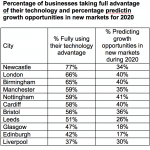The Tyne could be set to overtake the Thames when it comes to businesses modernising for the future.
Research commissioned by ThoughtWorks reveals that Newcastle is the top UK city when it comes to those making full use of their technology assets to win business, improve systems and attract the best talent.
With data suggesting Newcastle tech companies attracted more than £25m in investment during 2018, the city may still lag behind London and the south east when it comes to size of investment – but Newcastle emerges as the city where, in terms of business culture, business leaders are working the hardest to make the most of the tech assets at their disposal.
Ruth Harrison, managing director at ThoughtWorks UK said: “The findings for the business community in Newcastle, as well as other cities around the UK, underline that London is not the only tech hub in the country.
“Newcastle has demonstrated great success investing in and launching startups, the next challenge for the North East to scale these startups successfully and quickly to gain competitive advantage and cement the region as a significant and permanent contributor to the UK digital economy”.
 The survey of more than 1,000 business leaders across 11 cities revealed that, compared to Newcastle, London only just beat Birmingham into second place (66% vs 65%) when it comes to making full use of technology to win business, improve systems and attract the best people.
The survey of more than 1,000 business leaders across 11 cities revealed that, compared to Newcastle, London only just beat Birmingham into second place (66% vs 65%) when it comes to making full use of technology to win business, improve systems and attract the best people.
Nationally, more than half of business leaders do not believe their organisations are fully up to speed with developing technologies, with only about half (53%) saying they were fully utilising their technology to achieve competitive advantage.
The research also revealed that the level of tech agility of UK businesses related directly to how they thought Brexit would impact their business.
Those agile tech-driven businesses were far more likely to see Brexit as an opportunity to grow – 47% predicting growth opportunities to move into new markets and 19% believing they would be able to grow market share in existing markets.
But those that said their tech maturity was holding them back were far more likely to say Brexit would force them to put growth plans on hold (16%) or to downsize – and pull out of some key markets (10%).
The research suggests Brexit could become a catalyst that widens the tech gap in Britain between those agile enterprises that will grow in 2020 and those struggling with technology that will fall further behind.
Ruth Harrison, managing director, said: “Businesses large and small are grappling with new regulations on data protection, modernising legacy systems and using technology to reach new audiences with new propositions.
“Data protection, machine learning and legacy systems are no longer just tech issues – and it is pleasing to see that Newcastle business leaders are setting the example when it comes to putting tech agility at the heart of the board room agenda.”


